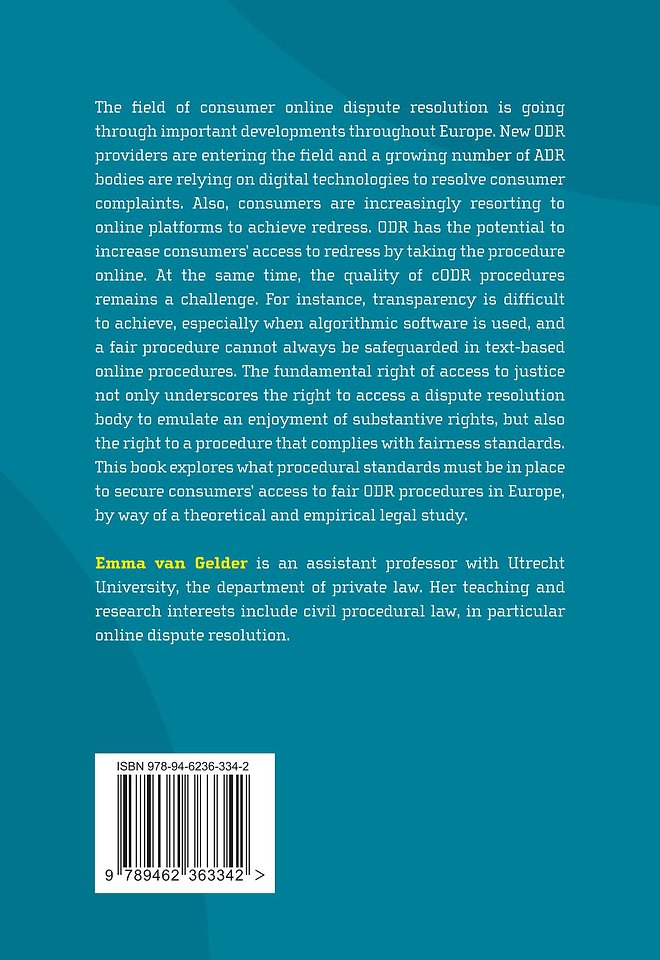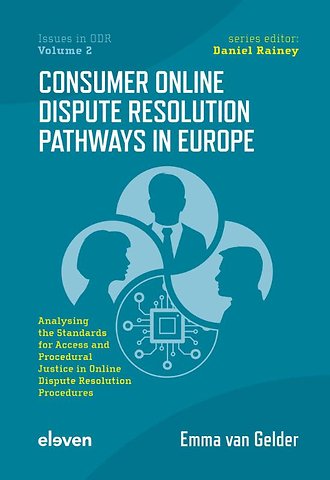



Emma van Gelder is an assistant professor at Utrecht University, Molengraaff Instituut. She worte a PhD at the Erasmus University Rotterdam, conducting research on online dispute resolution for consumers as a means of enhancing consumers’ access to justice in the EU. She received a master’s degree in Legal Research (cum laude, 2017) at the Utrecht University.
Meer over Emma van GelderConsumer Online Dispute Resolution Pathways in Europe
Analysing the Standards for Access and Procedural Justice in Online Dispute Resolution Procedures
Samenvatting
The field of consumer online dispute resolution is going through important developments throughout Europe. New ODR providers are entering the field and a growing number of ADR bodies are relying on digital technologies to resolve consumer complaints. Also, consumers are increasingly resorting to online platforms to achieve redress. ODR has the potential to increase consumers’ access to redress by taking the procedure online.
At the same time, the quality of cODR procedures remains a challenge. For instance, transparency is difficult to achieve, especially when algorithmic software is used, and a fair procedure cannot always be safeguarded in text-based online procedures. The fundamental right of access to justice not only underscores the right to access a dispute resolution body to emulate an enjoyment of substantive rights, but also the right to a procedure that complies with fairness standards. This book explores what procedural standards must be in place to secure consumers’ access to fair ODR procedures in Europe, by way of a theoretical and empirical legal study.
This research is financed by the ERC research council.
Trefwoorden
Specificaties
Inhoudsopgave
1 Introduction: cODR procedures and the search for justice 1
1.1 The difficult road to consumer access to justice 1
1.1.1 Consumer access to justice 1
1.1.2 Consumer redress pathways 2
1.1.3 Consumer online dispute resolution in Europe 4
1.1.4 cODR and access to justice 6
1.2 Research Question 7
1.3 Aims 8
1.4 Scope and delimitations 8
1.4.1 Access to Justice 9
1.4.1.1 Procedural Justice: A normative perspective 9
1.4.1.2 Procedural Justice: a social psychological perspective 10
1.4.2 Individual private enforcement 11
1.4.3 Consumers 12
1.5 Methodology 12
1.5.1 Research methods and sources 13
1.5.1.1 Doctrinal research 13
1.5.1.2 Empirical research 13
1.5.2 Selection of jurisdictions 16
1.6 Outline 19
2 Pathways to individual consumer redress in the EU 21
2.1 Introduction 21
2.2 Consumer redress: introductory remarks 22
2.2.1 The overlap between public and private enforcement 22
2.2.2 Private consumer redress through individual and collective action 25
2.2.3 Characteristics of consumer disputes 28
2.2.4 Information sources 31
2.3 Direct negotiation 32
2.3.1 Internal complaint handling mechanisms 34
2.3.2 Complaint assistance tools 35
2.3.3 A case-study: Klachtenkompas 38
2.3.4 Evaluation 47
2.4 Consumer alternative dispute resolution 48
2.4.1 A wide variety of consumer alternative dispute resolution models 48
2.4.1.1 Consumer ombudsmen models 49
2.4.1.2 Consumer arbitration bodies 49
2.4.1.3 Binding advice model 53
2.4.1.4 Consumer mediation services 54
2.4.2 The EU level: the ADR Directive and the ODR Regulation 57
2.4.3 The national level: the Netherlands 61
2.4.3.1 Dutch CDR bodies 61
2.4.3.2 Implementation of the ADR Directive 63
2.4.4 The national level: The United Kingdom 64
2.4.4.1 CDR bodies in the United Kingdom 65
2.4.4.2 Implementation of the ADR Directive 69
2.4.5 Consumer online dispute resolution 69
2.4.6 Evaluation 70
2.4.6.1 Underenforcement of consumer law 71
2.4.6.2 The quality of CDR 72
2.4.6.3 The low uptake of CDR 74
2.4.6.4 The private nature of CDR 76
2.5 Court procedures for resolving consumer claims 76
2.5.1 The EU approach 77
2.5.2 The national level: the Netherlands and the United Kingdom 78
2.5.3 Evaluation 81
2.6 Conclusion 82
3 A general introduction into ODR 85
3.1 Introduction 85
3.2 The origin and development of ODR 85
3.3 ODR techniques 88
3.3.1 Credit-card chargeback mechanisms 88
3.3.2 Online negotiation 89
3.3.3 Online mediation 91
3.3.4 Online arbitration 93
3.3.5 Online ombudsmen 94
3.3.6 Online mock jury 94
3.4 Opportunities of ODR 95
3.4.1 Cost savings 95
3.4.2 Time savings 96
3.4.3 Convenience 96
3.4.4 Feedback and regulatory function 97
3.5 Challenges of ODR 98
3.5.1 Digital exclusion 98
3.5.2 Costs 98
3.5.3 Loss of non-verbal cues 99
3.5.4 Technical difficulties 99
3.5.5 Security and privacy concerns 100
3.6 Initiatives on the regulation of ODR 100
3.7 Conclusion 102
4 Consumer online dispute resolution pathways to individual consumer redress in the EU 105
4.1 Introduction 105
4.2 cODR providers 106
4.2.1 Technologies used in cODR procedures 106
4.2.2 ODR techniques used by CDR bodies 108
4.2.3 Illustrations of European cODR providers 110
4.2.4 (c)ODR bodies operating in the Netherlands 115
4.2.4.1 ODR bodies 115
4.2.4.2 Consumer ODR in the Netherlands 120
4.2.5 ODR bodies operating in the United Kingdom 123
4.2.5.1 ODR bodies 123
4.2.5.2 Consumer ODR in the United Kingdom 125
4.2.6 Conclusions regarding the cODR field in the Netherlands and the United Kingdom 128
4.2.6.1 Definition on ODR 128
4.2.6.2 Wide variety in forms of ODR procedures 129
4.2.6.3 Access to CDR 130
4.2.6.4 Bringing parties to ODR 132
4.2.6.5 Levels of implementation of technology in ODR procedures 132
4.2.6.6 Loss of non-verbal cues and trust-building 133
4.2.6.7 Online text-based procedures 133
4.2.6.8 Digital qualifications of ODR staff 135
4.2.6.9 Legal qualifications of ODR staff 137
4.2.6.10 ODR as feedback and policy tool 138
4.2.7 Evaluation of cODR procedures 139
4.3 ODR procedures offered by online intermediary marketplaces 140
4.3.1 Relationships within online intermediary marketplaces 141
4.3.2 The ODR processes offered by online intermediary marketplaces 142
4.3.3 Examples of ODR processes offered by online intermediary marketplaces 144
4.3.4 Evaluation of the fairness of internal ODR procedures undertaken by online intermediary marketplaces 149
4.3.5 Court actions against online marketplaces 153
4.4 The EU ODR platform 155
4.4.1 The process of the EU ODR platform 155
4.4.2 Evaluation of the ODR platform and suggestions for improvement 157
4.4.2.1 Restricted scope 158
4.4.2.2 Limited functions 158
4.4.2.3 Voluntary nature 159
4.4.2.4 30-day deadline 160
4.4.2.5 Lack of standards of quality and expertise for ODR advisors 160
4.5 Conclusion 162
5 Standards of access and justice in cODR pathways 163
5.1 Introduction 163
5.2 The right to access to justice in European treaties 165
5.2.1 Procedural safeguards enshrined in Article 6(1) ECHR and 47 EU Charter 167
5.2.2 The development of access to justice from courts to ADR 171
5.2.3 The application of Articles 6(1) ECHR and 47 EU Charter to ODR 172
5.2.4 The importance of taking into accountArticles 6(1) ECHR and 47 EU Charter in the design of cODR 174
5.2.5 Evaluation 176
5.3 Access to fair CDR procedures in EU legislative instruments 177
5.3.1 Quality in ODR 178
5.3.2 Standards of quality in sectoral EU legislative instruments 180
5.3.3 Standards of quality of the ADR Directive and ODR Regulation 182
5.3.3.1 Accessibility 182
5.3.3.2 Independence, impartiality, and expertise 183
5.3.3.3 Transparency 184
5.3.3.4 Effectiveness 184
5.3.3.5 Fairness 184
5.3.3.6 Liberty 185
5.3.3.7 Legality 185
5.3.3.8 Summary 186
5.3.4 Quality of ODR at the national level 187
5.3.5 Evaluation 188
5.3.5.1 Accessibility 189
5.3.5.2 Independence, impartiality, and expertise 190
5.3.5.3 Transparency 191
5.3.5.4 Effectiveness 192
5.3.5.5 Fairness 193
5.3.5.6 Liberty 194
5.3.5.7 Legality 195
5.3.5.8 Summary 195
5.4 Access to a fair ODR procedure offered by online intermediary bmarketplaces 196
5.4.1 Quality in ODR processes offered by online intermediary marketplaces 196
5.4.2 The notion of online marketplaces 199
5.4.3 EU Regulatory framework for online intermediary marketplaces. 200
5.4.3.1 The P2B Regulation 201
5.4.3.2 The Digital Services Act 203
5.4.3.3 The GDPR 205
5.4.4 Evaluation 205
5.4.4.1 The P2B Regulation 206
5.4.4.2 The DSA 207
5.4.4.3 The GDPR 211
5.4.4.4 Summary 211
5.5 Conclusion 214
6 Consumer ODR as a pathway to individual consumer redress in the EU 217
6.1 Introduction 217
6.2 Access to fair cODR procedures offered by CDR bodies 219
6.2.1 Introduction 219
6.2.2 Access 221
6.2.3 Expertise, independence, and impartiality 228
6.2.4 Transparency 233
6.2.5 Effectiveness 236
6.2.6 Fairness 239
6.2.7 Liberty 245
6.2.8 Legality 246
6.3 Access to fair cODR mechanisms offered by online intermediary marketplaces 248
6.3.1 Introduction 249
6.3.2 Accessibility 250
6.3.3 Independence, impartiality, and expertise 255
6.3.4 Transparency 257
6.3.5 Effectiveness 259
6.3.6 Fairness 260
6.3.7 Liberty 264
6.3.8 Legality 265
6.4 The EU ODR platform 266
6.4.1 Enhanced information 266
6.4.2 Redirection 268
6.4.3 The integration of an online assisted-negotiation tool 270
6.4.4 An ODR function 273
6.4.5 A regulatory and feedback function 274
6.5 A monitoring framework 276
6.5.1 Monitoring framework for CDR bodies offering ODR procedures 276
6.5.2 Monitoring framework of ODR offered by online intermediary marketplaces 277
6.5.3 The EU ODR platform 280
6.5.4 A role for the civil court in the overall monitoring framework of cODR 280
6.6 The integration of enforcement mechanisms 281
6.7 Conclusion 283
Bibliography 285
Table of cases 319
Annex I Respondents 321
Annex II Survey 323
Anderen die dit boek kochten, kochten ook
Rubrieken
- cadeauboeken
- computer en informatica
- economie
- filosofie
- flora en fauna
- geneeskunde
- geschiedenis
- gezondheid
- jeugd
- juridisch
- koken en eten
- kunst en cultuur
- literatuur en romans
- mens en maatschappij
- naslagwerken
- non-fictie informatief/professioneel
- paramedisch
- psychologie
- reizen
- religie
- schoolboeken
- spiritualiteit
- sport, hobby, lifestyle
- thrillers en spanning
- wetenschap en techniek
- woordenboeken en taal





